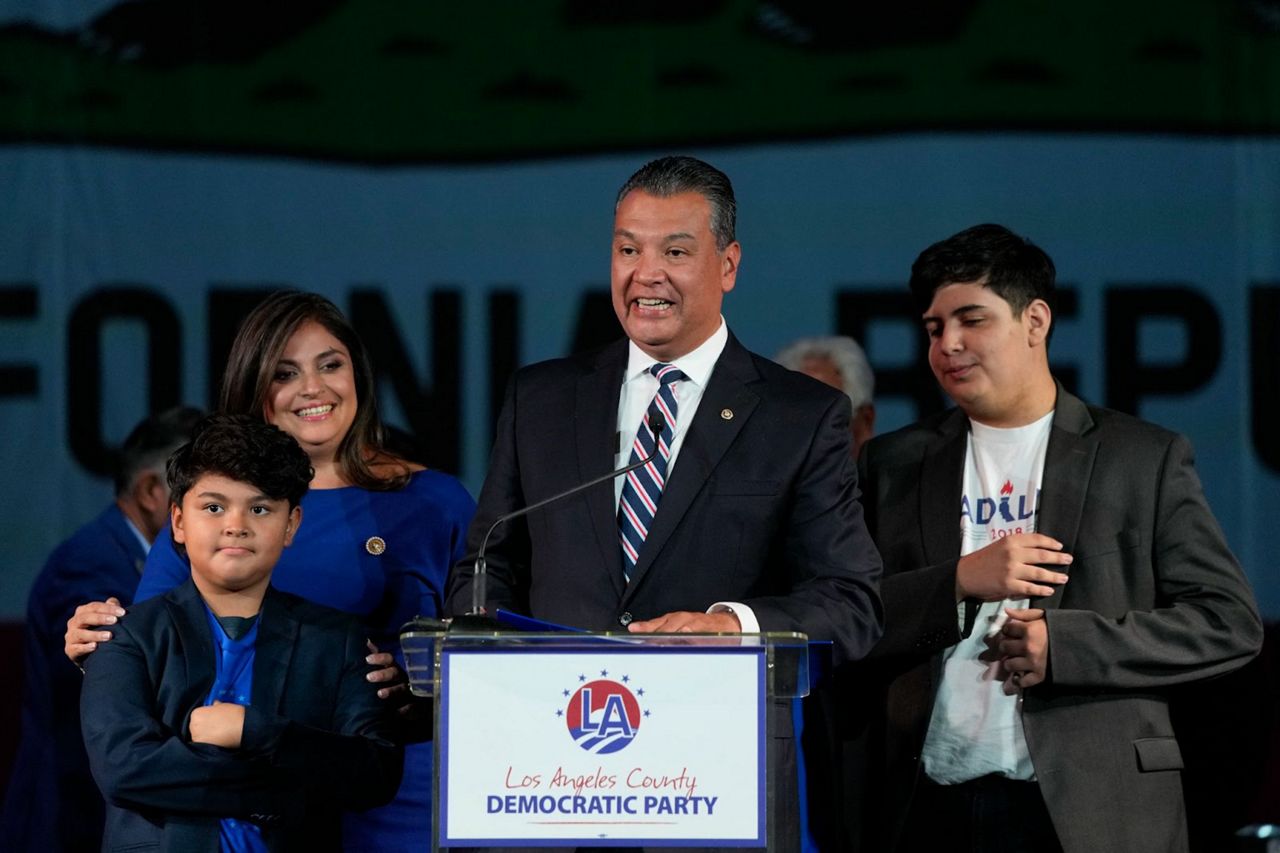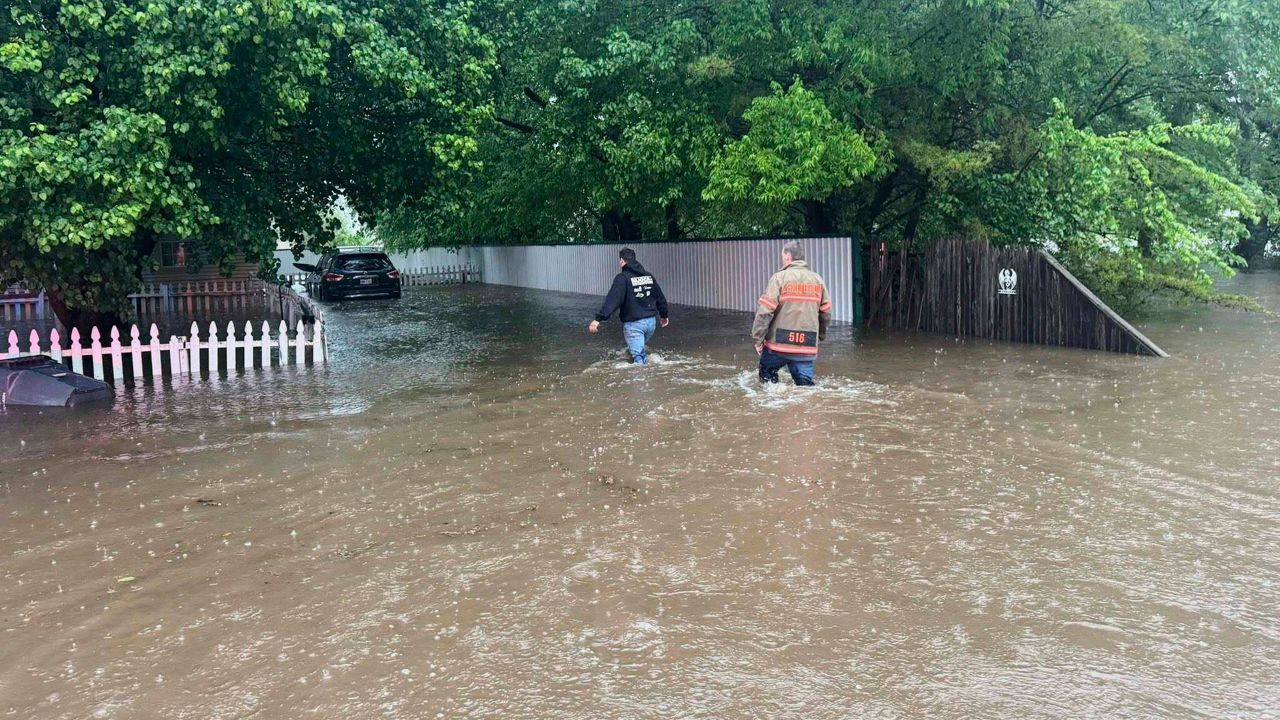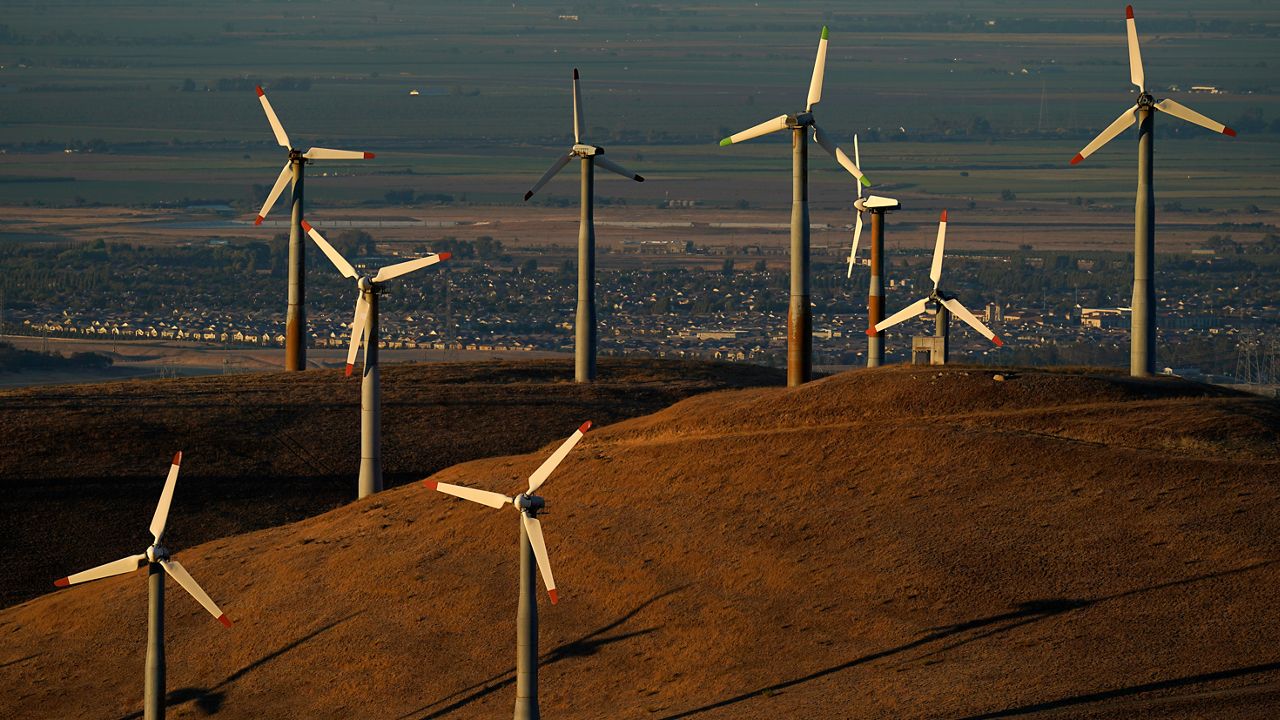Sen. Alex Padilla is the epitome of the American dream – the son of two immigrants from Mexico and the first Latino to represent California in the United States Senate –though he says as a kid, being in Congress wasn’t his dream career.
“I still get asked, 'Is this a dream come true, being a United States Senator for the state of California?'” Padilla said in an interview with Spectrum News in an interview ahead of his swearing-in for his first full term. “The honest answer is no, because when I was a kid, I never dreamt that this was real, that this was possible.”
The 49-year-old junior senator from California has already made history during his first two years in the Senate as the first Latino appointed to represent the Golden State in the upper chamber. Padilla was appointed by Gov. Gavin Newsom in 2020 after Kamala Harris resigned to become Vice President.
But he made history again as the first Latino elected to represent California in the Senate.

“I'm appreciative of the trust of the governor to give me the opportunity,” he said. “It's a tremendous opportunity, but also a tremendous responsibility, the job itself, but also being the first trying to represent so many.”
“Now that it's by virtue of an election, not an appointment, the opportunity, responsibility, I think, is even more elevated, because it really is having earned the trust of the people,” he added.
Prior to his appointment, Padilla served as California’s Secretary of State, a role he had held since 2015. The MIT graduate, who holds a degree in mechanical engineering, worked his way up through local politics: he was elected to the LA City Council at 26 in 1999, elected City Council President in 2001, and later served as a state senator for two terms from 2006-2014.
But prior to his appointment to fill Harris’ vacant seat, Padilla was a relatively unknown figure inside the Beltway. But upon his arrival in Washington, that quickly changed.
“When I first joined the Senate, it was during the darkest days of COVID, it was pre-vaccines,” Padilla recalled. “My hometown community of Pacoima was called the epicenter of the epicenter. And my dad still lives in the same neighborhood, in the same house where I grew up. Whether it's friends, close friends of the family, neighbors that didn't survive COVID I brought that sense of urgency to the job on that issue.”
He didn't stop with COVID relief. Over the next two years, in between campaigning for a second term and stumping for other democratic candidates across the country, Padilla has become a leading voice on immigration, climate change, voting rights, and women’s reproductive freedom – all issues he says have been important to him since he began his career in politics nearly three decades ago.
“I didn't just start fighting to address climate change. I didn't just start advocating for immigration reform. I just didn't, you know, start, you know, fighting for voting rights recently. They're personal values and have been my agenda for a long time. But I think I hit the ground running.”
After Newsom appointed Padilla to the Senate, the Los Angeles native felt the clock ticking.
The two years he spent in the Senate would be consumed by splitting his time between Washington and California – Padilla flies home each weekend to spend time with his wife, Angela, and their three sons – and if he decided he wanted to make a run for the senate seat in 2022, he would have to start campaigning just a year after arriving on Capitol Hill.
“We don't know how much time we're going to have, so gotta make each and every day count,” he recalled of his attitude when he arrived in Washington.

“I love Angela, I love my boys, and one of the toughest parts of this job is being away from them several days most weeks,” he said. “What I did everyday that I'm going to Washington, I kind of make it count. Because if I'm not doing everything I possibly can to do good and help people then I have a more important place to be [with my family].”
In his first two years, Padilla has sponsored 111 bills and co-sponsored 714, according to congressional records; Two of his bills have become law, and 15 that he co-sponsored now bear President Joe Biden’s signature.
The FIRE Act, which will strengthen the Federal Emergency Management Agency’s response and preparedness for wildfires, was signed into law in December. Padilla’s other bill, also signed last month, is the Iran Hostages Congressional Gold Medal Act which will provide the award to the 53 hostages of the Iran Hostage Crisis.
In the last two years, just 872 bills have been signed into law out of 17,806 introduced, which translates to less than 5% according to GovTrack.
Part of the reason so few bills ever make it to the President’s desk is due to the filibuster, the 60-vote threshold needed to pass most major legislation in the Senate. Padilla has been an outspoken advocate for reforming the filibuster after the Supreme Court overturned the constitutional right to an abortion in June.
“I believe the filibuster is the biggest obstacle not just on codifying a woman’s right to choose, immigration reform, restoring a federal right to vote that was lost,” Padilla ticked off on his fingers one by one, saying Democrats are going to try to continue the fight to codify a woman’s right to choose in the next term.
“We came up a little bit short,” Padilla admitted of Democrats' efforts to pass abortion rights legislation, though he touted Congress’ passage of a bill to protect same-sex and interracial unions, another Supreme Court decision criticized by conservative justices.
“We’ll continue the legislative push,” he pledged.
While Republicans in both chambers have been running on border security and immigration issues in recent elections, little has been accomplished by Democrats or Republicans to find a solution. Padilla calls it one of “the biggest frustrations and disappointments” of his first two years in the Senate that no real solutions have been offered up.
“No state has more at stake in it [immigration reform] than California, given the size and the diversity of our population, and the size and diversity of our economy,” said Padilla. “It’s important to recognize that immigrants contribute to the United States and to our economy.”
And for Padilla, the fight for immigration reform and protecting legal immigration is personal.
His parents, Santos and Lupe, immigrated separately from Mexico to Los Angeles, where they met, fell in love and later married. Padilla called it “a classic Los Angeles love story.”
“My mom used to clean houses, people working in the fields, or, you know, my dad was a short order cook working in a kitchen. We immigrants also contribute tremendously as consumers and as entrepreneurs,” he said. “I am that proud child of immigrants, watching them work so hard, sacrifice, frankly, for so many years, inspires me every single day.”
Upon his arrival in Washington, he was appointed chair of a subcommittee on the Senate Judiciary panel that oversees immigration policy, the first Latino to hold the position.
In fact, Padilla’s first bill as a senator was to create a pathway to citizenship for over 5 million essential workers without permanent legal status within the U.S. who continued to work during the pandemic.
“The fact that our immigration system is so outdated, clearly broken, is a big frustration, you would think that there's more bipartisan support to help dreamers to help farmworkers.”
Padilla, who often works across the aisle with Republicans, says it’s frustrating that his GOP colleagues play to their base rather than voting their conscience.
“My biggest disappointment, frankly, is hearing from some of my Republican colleagues behind closed doors, say the right thing: ‘oh, I am for farm workers, oh, I am for DREAMers, oh, I am for immigration reform,’ but they're not able or willing to say it publicly or vote accordingly. And they just immediately fall back to the excuse of, ‘well, Biden has to get the border and control.”
“There’s a lot of good ideas that have been presented as legislation,” Padilla added. “Many of these bills even have bipartisan support, more than 10 Republican co-sponsors on the bills, but they're not ready or willing to vote for the bills that they've lent their names to because of the pretext of the border.”
“[It’s] a tremendous frustration when Republicans either here in Washington or they'll do a photo op at the border slamming Democrats for immigration, but then don't offer solutions,” he continued.
Currently, the U.S. has been experiencing record low unemployment numbers, which Padilla says has only been exacerbated by the backlog of legal immigration.
“The wait times if people who need to cut who are willing to come to work in the United States in job areas that we need for our economy, for our health, and for our safety - when the wait are 10-12 years or even longer, that's what adds the pressure for people to come through other means, and that's ultimately what we're trying to tackle as well.”
As the former Secretary of State of California, Padilla joins a small club of former secretaries to now serve in the Senate. Just three other former secretaries, Sens. Joe Manchin, D-W.Va., Sherrod Brown, D-Ohio, and Roy Blunt, R-Mo, served alongside Padilla over the last two years.
With Blunt retiring, that number becomes even smaller.
His former office gave Padilla a front row seat to how elections operate; it also gave him insight into just how often we take for granted our right to vote.
Padilla pointed to the 2013 Supreme Court ruling in Shelby v. Holder, which he says “took the teeth out of the Federal Voting Rights Act,” and enabled states across the country to put in place laws that made it “harder for eligible citizens to register to vote, stay registered to vote, or actually cast their ballot, whether it was voter ID laws, purging the voter rolls, you name it.”
In 2014, he ran for Secretary of State.
“California, as we do in so many policy areas, had an opportunity and an obligation to lead. And so when I ran for Secretary of State and was elected, we started advancing all the pro-voter and election security reforms, from expanding vote by mail in person early voting, ballot tracking, automatic voter registration, same day voter registration post, more sophisticated post election audits,” Padilla recalled, saying he wanted to make it easier for “eligible people to vote, have their vote counted, and people have faith in the results of the elections.”
When he was sworn in on January 20, 2021, it was just two weeks to the day that insurrectionists had stormed the Capitol, claiming the 2020 election was stolen. That resonated with Padilla, and enforced his desire to reform elections nationwide as he did in California during his tenure as secretary of state.
“Nobody can argue they have more voters,” said Padilla (California had 21.9 million registered voters in October 2022). “Nobody can say ‘we're more diverse than California.’ Nobody. There's no more excuses. It's now just a matter of political will.”
“We've shown that these reforms work. It's good for democracy, good for election security,” he added. “I'm now as a senator trying to engage in this debate, [I’m] one of the few that can talk to every single senator, and answer those questions, explain exactly how it works, and why these are good. And we're going to keep fighting until we once again secure a right to vote in federal law.”
When Padilla takes the oath of office on Jan. 3, he said immigration reform, protecting voting rights, and climate change remain at the forefront. He added that he also wants the federal government to work with state and local officials to address affordable housing and the homelessness crisis that Californians are all too familiar with.
Padilla also promised that Democrats will continue to protect the social safety net.
“Democrats are going to defend Social Security, because it continues to be under attack by Republicans, to say you know, for those who have paid into Social Security or Medicare, we're going to defend those benefits when you're eligible to receive them,” said Padilla. “If fight for those we have to, fight for those we will.”
Padilla spent time on the campaign trail this past fall for both his fellow Californians as well as other candidates such as Senators Michael Bennet, D-Colo, and Mark Kelly, D-Ariz., Both won re-election. Padilla raised over $12 million and has over $7 million still in his war chest.
His name was floated to be the next chair of the Democratic Senatorial Campaign Committee. Sen. Gary Peters, D-Mich., has said he won’t return to the post, and the 2024 election map swings in the GOP’s favor. Majority Leader Chuck Schumer, D-N.Y. has yet to name someone to the position.
A spokesperson for Padilla told the Huffington Post in mid-December he wanted to spend time with his children and was not interested in the post. But when we asked him if Schumer called on him to serve if he would consider it, he demurred.
“I tell Sen. Schumer and I have told him, he needs to talk to my wife about this,” he laughed, adding between growing their family and running for political office, the last 10 years has been a busy time for the Padilla family. “I think my kids deserve for me to have just one full time job at a time and try to get a little bit of a better rhythm and healthier balance, before we take on the next extracurricular activity.”
As for a Biden 2024 re-election campaign, Padilla said he is all in on the commander in chief.
“I've heard President Biden repeatedly say it his intention to run again, and my intention is to support him, to do everything I can to help him get reelected in 2024, to help take back the House, help to keep if not grow our Senate majority, and keep making progress on all the issues that we've been talking about.”
As we wrapped up our conversation with Padilla, he was preparing to head back to the Senate floor to vote on the National Defense Authorization Act. He was hoping the Senate would wrap up it’s business by the end of the day so he could catch his flight home to Los Angeles to see his wife and kids. Each weekend he makes the 2,306 mile flight from Washington to LAX to be with his family.
“It is tough [to be away], but worth it given the opportunity to do good in this job,” he explained. “It's the only quiet time I get, the plane ride, because when I'm in Washington, I'm going to go, go, go. When I get home, I try to do as much as I can to help around the house and pack lunches in the morning, take kids to school, and of course, there's sports and other activities over the weekend.”
His sons, Roman, Alex, and Diego range from 7 to 15 years of age; While each of them are starting to understand the importance of their father’s job, they are also influencing how he approaches policy: Padilla, who will celebrate his 50th birthday in March, is one of the youngest senators in the chamber.
“It is a unique opportunity to weigh in on some issues,” said Padilla. “When we talk about childcare, or early childhood education, the importance of vaccines for young people, it's not my grandkids that I'm talking about, like a lot of my colleagues, it's my very own children. So I bring the real world experience of what those costs are, what those struggles are, to the discussion.”
Before he heads to the next Model U.N. event or baseball game, or whatever activity his sons have lined up, he’ll try to catch a nap or read some briefing materials. Or maybe he’ll finally get to crack open a book; his latest read, “Kitchen Confidential” by Anthony Bourdain is one he recommends highly.
But as he prepares to take his oath of office on Jan. 3, he will use his plane ride to reflect on his road to Washington: on the little boy, the son of immigrants, who now inhabits a large Washington office, and is the voice for millions of Californians on Capitol Hill.
“I hope that through my service and how I serve that for a lot of young people, not Alex Padillas, but little girls and boys of every race and color and economic backgrounds, that they can genuinely believe that they can do it.”









_crop)